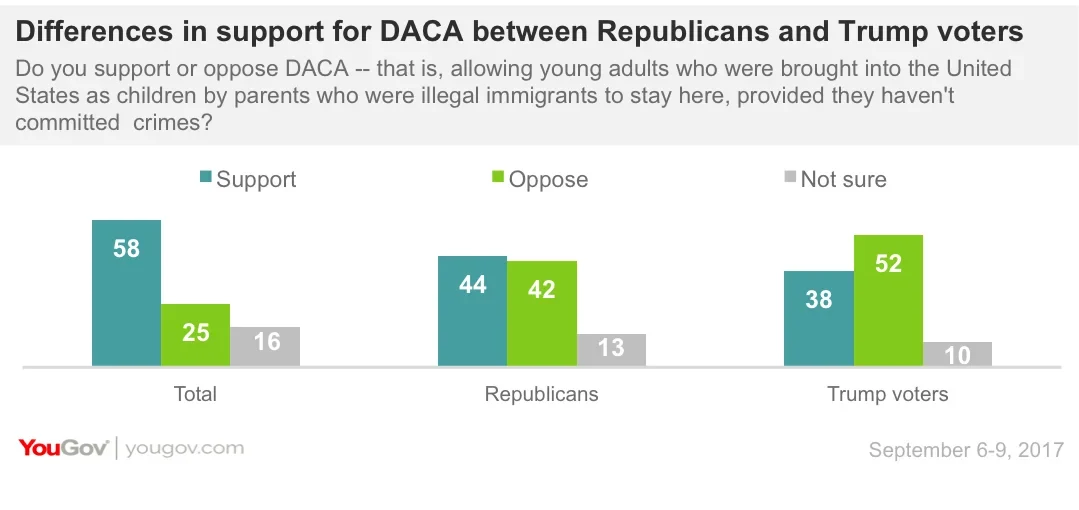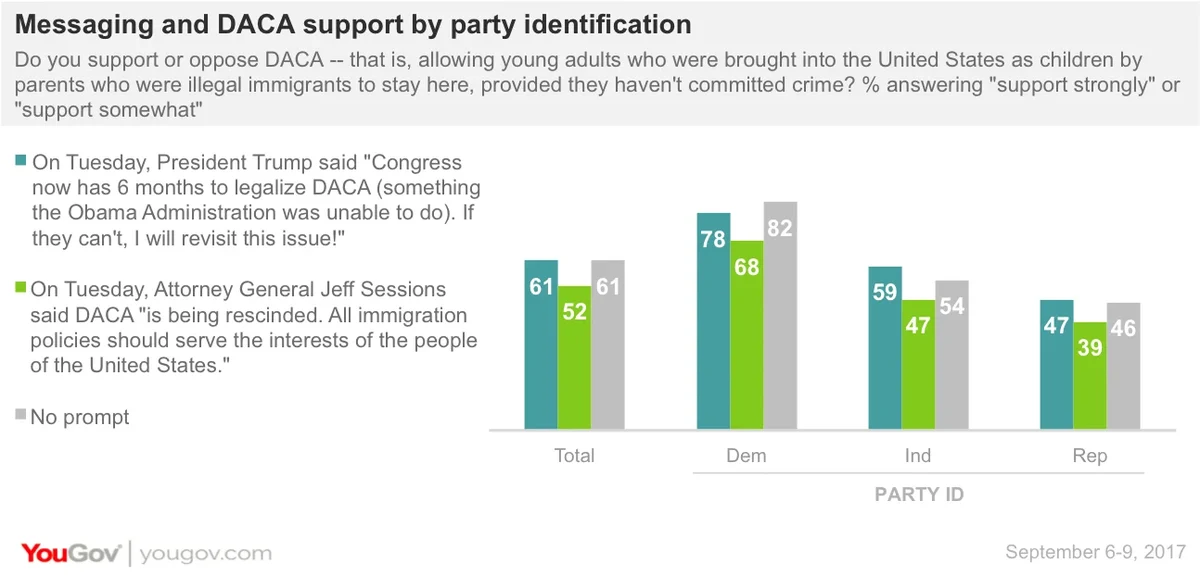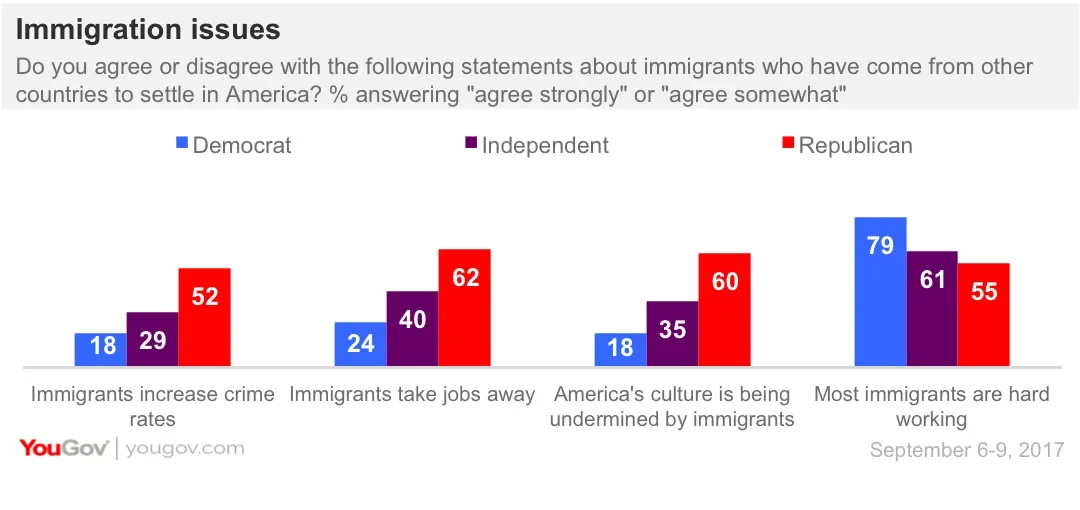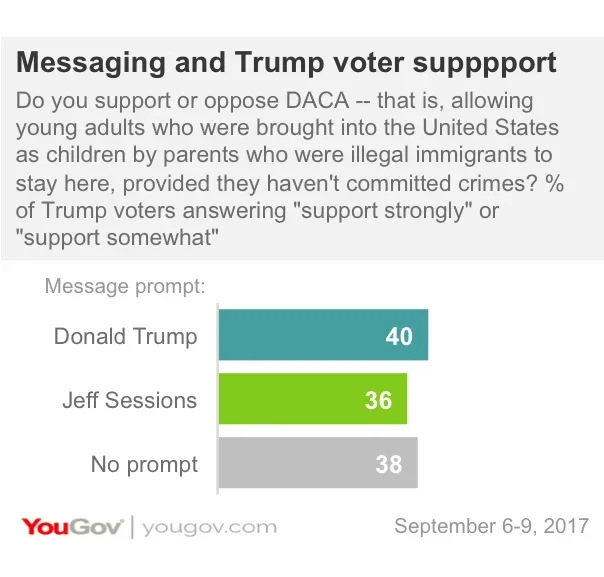Mixed messages from the White House reflect divisions within the Republican Party
Our recent poll of 2,271 Americans shows President Trump has put himself in a tough spot on one of his signature issues - immigration. Trump's decision to phase out the Deferred Action for Childhood Arrivals (DACA) program, which allows some undocumented immigrants who arrived in America as children and do not have criminal records to stay in the country, has prompted varied responses on the right.

That includes the president himself. On the same day Trump and Attorney General Jeff Sessions announced an end to DACA, slamming it as an ineffective "amnesty-first approach," Trump tweeted that Congress should act before the 6-month expiration deadline to save the program or he would "revisit this issue." Later, at the urging of Democratic House Minority Leader Nancy Pelosi, he added, "For all of those (DACA) that are concerned about your status during the 6 month period, you have nothing to worry about - no action!"
To understand the impact of these different messages on public opinion we tested three treatments of a support/oppose question for DACA. One version was preceded by Trump's positive tweet: "Congress now has 6 months to legalize DACA (something the Obama Administration was unable to do). If they can't, I will revisit this issue!" A second version indicated that Attorney General Sessions had announced that DACA "is being rescinded. All immigration policies should serve the interests of the people of the United States." A third had no pre-question messaging at all.

Overall, DACA is broadly popular. Depending on the message treatment used, between 52% and 61% of Americans favor DACA, described in our survey as "allowing young adults who were brought into the United States as children by parents who were illegal immigrants to stay here, provided they haven't committed crimes." Across all three, Americans are in favor by more than a 2-to-1 margin (58%-25%), with opposition failing to reach 30% in any of the treatments.
Republicans are split on the issue. Perhaps of most importance to Trump, his own partisans are divided down the middle and it doesn’t make much difference what you tell them. Republicans are in favor by 5 points with no messaging, in favor by 6 points after seeing the Trump statement, and opposed by 6 points after seeing the Sessions statement, with no position reaching a majority in any of the three tests. Trump voters are marginally more likely to be opposed than Republicans but even among that group about 4 in 10 support DACA and 52% oppose it regardless of message.

These results echo Republicans' occasionally conflicting underlying views on immigration. On one hand, majorities of Republicans believe that immigrants take jobs away from people born in the U.S. (62%), America's culture is being undermined by immigrants (60%), and immigrants increase crime rates (52%). On the other hand , similar numbers believe that most immigrants are hard-working (55%) and decline to say that being born in the U.S. is a very important part of being "truly American" (57%). This hints at a more heterodox view of immigration among Republicans than many commentators have suggested.
Democrats are strongly in favor but negative messaging dampens support. One surprising group that appears to respond to Attorney General Sessions' anti-DACA statement is Democrats. Support for DACA that is nearly unanimous with no messaging (82%-10%) is reduced to 68%-19% when they hear from Sessions, a source they would seem likely to mistrust. Still, even after hearing from only one side of the issue with no rebuttal from supporters, Democrats remain in favor by a 50-point margin.

Trump's semi-endorsement is a wash. Support for DACA is an identical 61% in the versions with no messaging and Trump's tweet. Even among Trump voters, support only increases 2 points.
Trump and the White House have some tough decisions to make about the DACA program, especially as it concerns their Republican base. Research has shown that even subtle partisan cues can often have a substantial impact on Americans' views of political and economic issues. With mixed messages from party leaders and a divided rank-and-file, DACA may not be one of those issues.
Feel free to explore the data on your own here:
See the full results from this poll
Image: Getty











